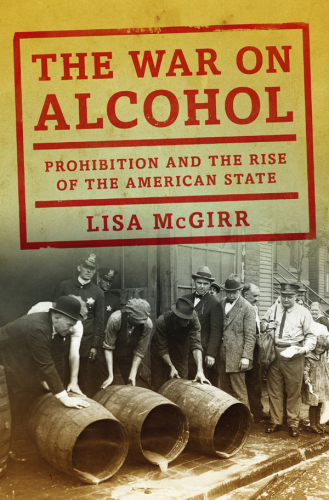
The War on Alcohol
Prohibition and the Rise of the American State
کتاب های مرتبط
- اطلاعات
- نقد و بررسی
- دیدگاه کاربران
نقد و بررسی

August 17, 2015
The Hollywood narrative of Prohibition as a time of gangsters spraying bullets from machine guns is blown wide open in McGirr’s ambitious history of the 14-year period in early 20th-century America and its repercussions for social mores, public policy, and the criminal justice system. Using personal papers as well as records of state and federal commissions on enforcement, McGirr (Suburban Warriors), a professor of history at Harvard, delves into the details of the often uneasy alliances between Protestant temperance advocates, who fought for the Volstead Act and ratification of the 18th Amendment, and Klansmen, who helped enforce liquor laws on the local level. McGirr touches on oft-glamorized tales of bootlegging gangsters and speakeasies, instead choosing to focus on the stories of everyday victims of enforcement based on racial, religious, and class discrimination. This occurred in tandem with the racial integration of Southern bootleggers and speakeasy patrons. Both sobering and enlightening, McGirr’s work gives Prohibition and its consequences a much-needed reexamination that provides insights relevant to today’s War on Drugs. Photos.

October 1, 2015
McGirr (history, Harvard Univ., Suburban Warriors) takes a fresh and fascinating look at Prohibition, arguing that it should not be viewed as a failed experiment, but as one of the defining political and social movements of the 20th century. The author skims over familiar stories about the Women's Christian Temperance Union, Al Capone, and the rise of speakeasies, and focuses instead on the heavy-handed enforcement of the law, especially its effects on immigrant and minority communities. The fight to ban alcohol led to raids on private homes, a growing prison population, and an emphasis on punishment over rehabilitation. McGirr draws a direct line from Prohibition to the current war on drugs, demonstrating that the 1920s saw a vast and lasting expansion of the federal role in law enforcement. The era also had significant political consequences, mobilizing working-class immigrants to join the anti-Prohibition Democratic party and bringing African Americans into the party for the first time since the end of the Civil War, leading to a coalition that would elect Franklin D. Roosevelt in 1932. VERDICT McGirr's new perspective on Prohibition is recommended for all readers interested in American history.--Nicholas Graham, Univ. of North Carolina, Chapel Hill
Copyright 2015 Library Journal, LLC Used with permission.

























دیدگاه کاربران